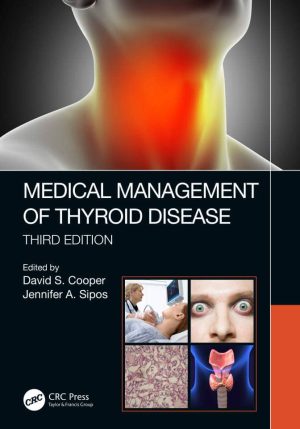کتاب Medical Management of Thyroid Disease در مورد مدیریت پزشکی بیماری تیروئید بوده و اطلاعات مفیدی در مورد تیروئید به شما میدهد.
سرفصلهای کتاب Medical Management of Thyroid Disease:
- Preface
- Editors
- Contributors
- 1 The laboratory and imaging approaches to thyroid disorders Jacqueline Jonklaas and David S. Cooper
- 2 The diagnostic evaluation and management of hyperthyroidism due to Graves’ disease, toxic nodules, and toxic multinodular goiter David S. Cooper
- 3 Thyroiditis Robert C. Smallridge and Victor Bernet
- 4 Rare forms of hyperthyroidism Nicole O. Vietor and Henry B. Burch
- 5 Drug-induced thyroid dysfunction Victor Bernet and Robert C. Smallridge
- 6 Hypothyroidism Michael T. McDermott
- 7 Thyroid nodules and multinodular goiter Poorani N. Goundan and Stephanie L. Lee
- 8 Differentiated thyroid carcinoma Carolyn Maxwell and Jennifer A. Sipos
- 9 Medullary thyroid carcinoma in medical management of thyroid disease Mimi I. Hu, Elizabeth G. Grubbs, and Julie Ann Sosa
- 10 Anaplastic thyroid carcinoma and thyroid lymphoma Ashish V. Chintakuntlawar and Keith C. Bible
- 11 Surgical approach to thyroid disorders Vaninder K. Dhillon and Ralph P. Tufano
- 12 Thyroid disease and pregnancy 275
- Alisha N. Wade and Susan J. Mandel
- Index
مقدمهای بر کتاب Medical Management of Thyroid Disease:
It has been more than 10 years since the second edition of Medical Management of Thyroid Disease was published. When I was asked by the publisher to edit this third edition of the text, I invited Dr. Jennifer Sipos from The Ohio State University to be my coeditor.
Together, we have continued the tradition of this book, which was initially developed to be a practical guide on the management of both common and uncommon thyroid problems. We have tried, as much as possible, to limit the discussion to the clinical manifestations, diagnostic procedures, and treatment of the gamut of thyroid disorders in adults.
As before, to the greatest degree possible, all of the recommendations in the text are “evidence-based” or recapitulate evidence-based clinical practice guidelines. We have invited a number of new authors to provide a fresh approach to some of the topics.
Since the last edition of this text was published in 2008, there have been remarkable strides in our ability to care for thyroid patients. In the realm of benign thyroid disease, we now recognize that drug-induced thyroid dysfunction includes a large array of new drugs that inhibit tyrosine kinases, have effects on the immune system as “checkpoint inhibitors,” or have other more ill-defined effects.
An entire chapter is devoted to this topic, in recognition of its importance.
In the treatment of hypothyroidism, clinicians are now feeling more justified in using T4/T3 combination therapy in some patients, reflecting a better understanding that T4 monotherapy may not recapitulate the serum hormonal profile of the thyroid gland itself.
There has been a revolution in the management of thyroid nodules, including a new classification for cytopathology (the Bethesda system), as well as the development of molecular testing for improved diagnosis of indeterminate thyroid nodules.
There has also been a sea change in the way low-risk thyroid cancer is managed, based on the 2015 American Thyroid Association clinical practice guidelines. Instead of a “one-size-fits-all” approach, we now have a more personalized set of management strategies, based on the recognition that more aggressive treatment (i.e., total thyroidectomy, radioiodine ablation, and full suppression of serum TSH) is not necessary for the vast majority of thyroid cancer patients. Furthermore, there are now a number of randomized clinical trials which have helped to define the best management for advanced thyroid cancers.
Dr. Sipos and I want to thank the contributors to this text for their time and expertise. We also want to express our gratitude to two of our mentors, Dr. E. Chester Ridgway and Dr. Ernest Mazzaferri. Both were giants in the field of thyroidology, both contributed to the first and second editions of this text, and both have sadly passed away in the last several years. We wish to recognize them for their guidance, and for being inspiring role models and colleagues. Finally, we hope that practitioners will benefit from reading this textbook, but we understand that the ultimate beneficiaries of the knowledge gained will be the millions of patients suffering from thyroid disease around the world.
David S. Cooper, MD
The Johns Hopkins University School of Medicine
Jennifer A. Sipos, MD
The Ohio State University Wexner Medical Center
فایل کتاب Medical Management of Thyroid Disease را میتوانید پس از پرداخت، دریافت کنید.


دیدگاهها
هیچ دیدگاهی برای این محصول نوشته نشده است.